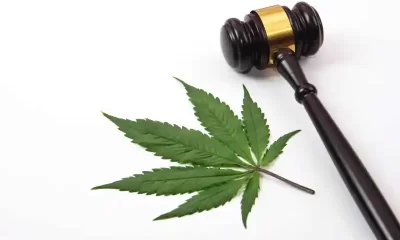Business
New Cannabis Consumption Lounge License Approved in Nevada

LA Lounge LLC has received the first conditional cannabis consumption license for a business that isn’t a dispensary.
With the debut of The Sphere in Las Vegas, Nevada and the growing updates for entertainment and tourism, officials are slowly moving forward with consumption lounge license approval. On July 25, the Nevada Cannabis Compliance Board (CCB) approved the state’s first conditional license for a stand-alone cannabis consumption lounge.
The first winning license belongs to LA Lounge LLC, which is the first independent company that’s not connected to a dispensary. According to KTNV Las Vegas, the owners don’t have a location picked out yet, but once they do it will need to be inspected by the CCB before beginning operation. Once a business receives a license, they have one year to get things up and running.
The first round of consumption lounge licenses were approved in June, which included Planet 13 and Thrive Cannabis Marketplace in Clark County, and The Venue at SoL Cannabis in Washoe County. These businesses could see their consumption lounges open up by the end of 2023, if they receive final approval from the CCB. “We get asked about it daily by most customers,” said David Farris, Vice President of Sales and Marketing with Planet 13.
Recently, CCB Executive Director Tyler Klimas confirmed that things are progressing well. “It sounds like we will likely see some consumption lounges open by the end of the year, maybe some as soon as October,” Klimas said, according to KTNV Las Vegas. At the most recent meeting, the CCB also adopted new regulations for air ventilation requirements that are supposed to make it easier for applicants to comply with.
Another prospective license owner, Chandler Cooks, attended the July 25 meeting. He told KTNV Las Vegas that he plans to open a lounge called Moulin Noir in downtown Las Vegas. “We already submitted everything that is required of us, so we are hoping to be at the next CCB meeting and get the conditional license,” Cooks said. “Ideally, we would like to be open by January. We want to beat the curve for Super Bowl.” The next CCB meeting will be held on August 22 for more potential licenses to be granted.
Consumption lounges were approved in June 2022. Prior to that, visitors and residents could only consume cannabis within a private residence. Forty conditional licenses were approved last fall. “We will do sit down interviews and make sure we understand their ownership structure and their business plan and then they will come in front of the board and the board will determine them suitable or not to proceed to perfecting their license,” Klimas said at the time.
The Las Vegas Convention and Visitors Authority reported in January that 38.8 million people visited Las Vegas in 2022. While the state of Nevada stands to benefit greatly from its consumption lounges, other states have also been progressing with public consumption locations as well.
In California, consumption lounges are in full swing in places like San Francisco, which has a rich history with lounges during its early medical cannabis era. Alaska adopted early rules for consumption lounges in 2018, and the first one opened in 2021. Colorado started accepting license applications back in 2021, and so far there are a few private lounges that are currently available.
Other states such as Massachusetts have approved social consumption programs but have not yet finalized plans. Most recently in June and July, the Massachusetts Cannabis Control Commission (CCC) held listening sessions for social consumption “to hear from stakeholders prior to drafting new policies. After draft regulations are prepared and published, there will be notice of a formal public comment period as an opportunity to provide additional feedback.”
In May, Massachusetts Gaming Commissioner Bruce Stebbins explained that the state’s pilot program would be “burdensome and expensive” and the CCC scrapped it in favor of a more streamlined process.
Source: https://hightimes.com/news/new-cannabis-consumption-lounge-license-approved-in-nevada/
Business
New Mexico cannabis operator fined, loses license for alleged BioTrack fraud

New Mexico regulators fined a cannabis operator nearly $300,000 and revoked its license after the company allegedly created fake reports in the state’s traceability software.
The New Mexico Cannabis Control Division (CCD) accused marijuana manufacturer and retailer Golden Roots of 11 violations, according to Albuquerque Business First.
Golden Roots operates the The Cannabis Revolution Dispensary.
The majority of the violations are related to the Albuquerque company’s improper use of BioTrack, which has been New Mexico’s track-and-trace vendor since 2015.
The CCD alleges Golden Roots reported marijuana production only two months after it had received its vertically integrated license, according to Albuquerque Business First.
Because cannabis takes longer than two months to be cultivated, the CCD was suspicious of the report.
After inspecting the company’s premises, the CCD alleged Golden Roots reported cultivation, transportation and sales in BioTrack but wasn’t able to provide officers who inspected the site evidence that the operator was cultivating cannabis.
In April, the CCD revoked Golden Roots’ license and issued a $10,000 fine, according to the news outlet.
The company requested a hearing, which the regulator scheduled for Sept. 1.
At the hearing, the CCD testified that the company’s dried-cannabis weights in BioTrack were suspicious because they didn’t seem to accurately reflect how much weight marijuana loses as it dries.
Company employees also poorly accounted for why they were making adjustments in the system of up to 24 pounds of cannabis, making comments such as “bad” or “mistake” in the software, Albuquerque Business First reported.
Golden Roots was fined $298,972.05 – the amount regulators allege the company made selling products that weren’t properly accounted for in BioTrack.
The CCD has been cracking down on cannabis operators accused of selling products procured from out-of-state or not grown legally:
- Regulators alleged in August that Albuquerque dispensary Sawmill Sweet Leaf sold out-of-state products and didn’t have a license for extraction.
- Paradise Exotics Distro lost its license in July after regulators alleged the company sold products made in California.
Golden Roots was the first alleged rulebreaker in New Mexico to be asked to pay a large fine.
Source: https://mjbizdaily.com/new-mexico-cannabis-operator-fined-loses-license-for-alleged-biotrack-fraud/
Business
Marijuana companies suing US attorney general in federal prohibition challenge

Four marijuana companies, including a multistate operator, have filed a lawsuit against U.S. Attorney General Merrick Garland in which they allege the federal MJ prohibition under the Controlled Substances Act is no longer constitutional.
According to the complaint, filed Thursday in U.S. District Court in Massachusetts, retailer Canna Provisions, Treevit delivery service CEO Gyasi Sellers, cultivator Wiseacre Farm and MSO Verano Holdings Corp. are all harmed by “the federal government’s unconstitutional ban on cultivating, manufacturing, distributing, or possessing intrastate marijuana.”
Verano is headquartered in Chicago but has operations in Massachusetts; the other three operators are based in Massachusetts.
The lawsuit seeks a ruling that the “Controlled Substances Act is unconstitutional as applied to the intrastate cultivation, manufacture, possession, and distribution of marijuana pursuant to state law.”
The companies want the case to go before the U.S. Supreme Court.
They hired prominent law firm Boies Schiller Flexner to represent them.
The New York-based firm’s principal is David Boies, whose former clients include Microsoft, former presidential candidate Al Gore and Elizabeth Holmes’ disgraced startup Theranos.
Similar challenges to the federal Controlled Substances Act (CSA) have failed.
One such challenge led to a landmark Supreme Court decision in 2005.
In Gonzalez vs. Raich, the highest court in the United States ruled in a 6-3 decision that the commerce clause of the U.S. Constitution gave Congress the power to outlaw marijuana federally, even though state laws allow the cultivation and sale of cannabis.
In the 18 years since that ruling, 23 states and the District of Columbia have legalized adult-use marijuana and the federal government has allowed a multibillion-dollar cannabis industry to thrive.
Since both Congress and the U.S. Department of Justice, currently headed by Garland, have declined to intervene in state-licensed marijuana markets, the key facts that led to the Supreme Court’s 2005 ruling “no longer apply,” Boies said in a statement Thursday.
“The Supreme Court has since made clear that the federal government lacks the authority to regulate purely intrastate commerce,” Boies said.
“Moreover, the facts on which those precedents are based are no longer true.”
Verano President Darren Weiss said in a statement the company is “prepared to bring this case all the way to the Supreme Court in order to align federal law with how Congress has acted for years.”
While the Biden administration’s push to reschedule marijuana would help solve marijuana operators’ federal tax woes, neither rescheduling nor modest Congressional reforms such as the SAFER Banking Act “solve the fundamental issue,” Weiss added.
“The application of the CSA to lawful state-run cannabis business is an unconstitutional overreach on state sovereignty that has led to decades of harm, failed businesses, lost jobs, and unsafe working conditions.”
Business
Alabama to make another attempt Dec. 1 to award medical cannabis licenses

Alabama regulators are targeting Dec. 1 to award the first batch of medical cannabis business licenses after the agency’s first two attempts were scrapped because of scoring errors and litigation.
The first licenses will be awarded to individual cultivators, delivery providers, processors, dispensaries and state testing labs, according to the Alabama Medical Cannabis Commission (AMCC).
Then, on Dec. 12, the AMCC will award licenses for vertically integrated operations, a designation set primarily for multistate operators.
Licenses are expected to be handed out 28 days after they have been awarded, so MMJ production could begin in early January, according to the Alabama Daily News.
That means MMJ products could be available for patients around early March, an AMCC spokesperson told the media outlet.
Regulators initially awarded 21 business licenses in June, only to void them after applicants alleged inconsistencies with how the applications were scored.
Then, in August, the state awarded 24 different licenses – 19 went to June recipients – only to reverse themselves again and scratch those licenses after spurned applicants filed lawsuits.
A state judge dismissed a lawsuit filed by Chicago-based MSO Verano Holdings Corp., but another lawsuit is pending.
Source: https://mjbizdaily.com/alabama-plans-to-award-medical-cannabis-licenses-dec-1/
-

 Business2 years ago
Business2 years agoPot Odor Does Not Justify Probable Cause for Vehicle Searches, Minnesota Court Affirms
-

 Business2 years ago
Business2 years agoNew Mexico cannabis operator fined, loses license for alleged BioTrack fraud
-

 Business2 years ago
Business2 years agoAlabama to make another attempt Dec. 1 to award medical cannabis licenses
-

 Business2 years ago
Business2 years agoWashington State Pays Out $9.4 Million in Refunds Relating to Drug Convictions
-

 Business2 years ago
Business2 years agoMarijuana companies suing US attorney general in federal prohibition challenge
-

 Business2 years ago
Business2 years agoLegal Marijuana Handed A Nothing Burger From NY State
-

 Business2 years ago
Business2 years agoCan Cannabis Help Seasonal Depression
-

 Blogs2 years ago
Blogs2 years agoCannabis Art Is Flourishing On Etsy













